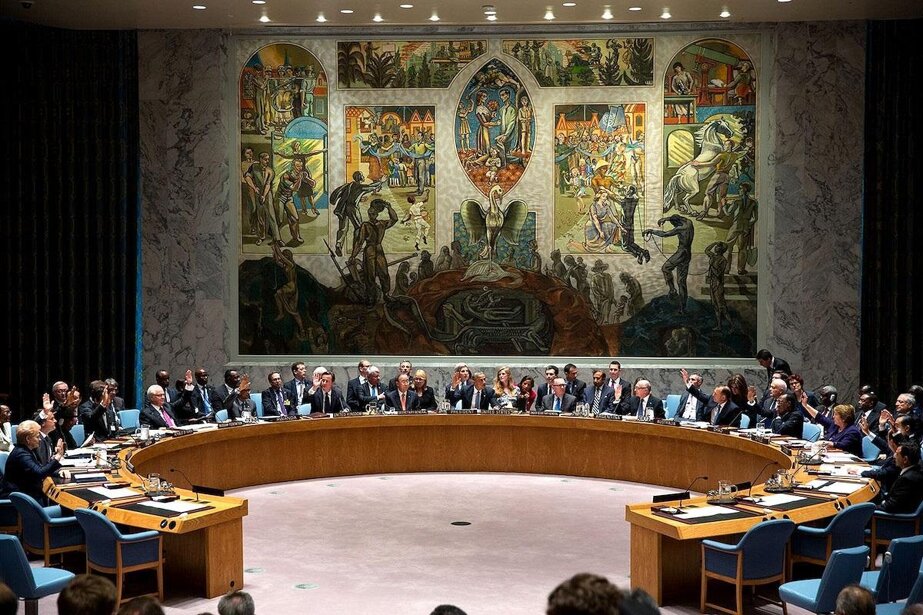Rappresentare il Presente:
la proposta di United for Consensus per un nuovo Consiglio di Sicurezza
Di Elena Cioffi

21 Novembre 2024
6 minuti di lettura
English version below
Nel contesto internazionale, il Consiglio di Sicurezza delle Nazioni Unite (UNSC) riveste un ruolo importante nel mantenimento della pace e della sicurezza globali. Istituito nel 1945 all’indomani della Seconda Guerra Mondiale, l’UNSC è stato incaricato del compito cruciale di affrontare le minacce alla stabilità internazionale e di promuovere un mondo più sicuro. Il suo mandato include l’autorizzazione di azioni militari, l’imposizione di sanzioni e l’istituzione di operazioni di mantenimento della pace. La composizione e le dinamiche di potere dell’UNSC sono stabilite dalla Carta delle Nazioni Unite. In particolare, l’Articolo 23 descrive la struttura del Consiglio, specificando che deve essere composto da quindici membri: cinque membri permanenti—Cina, Francia, Russia, Regno Unito e Stati Uniti—e dieci membri non permanenti eletti dall’Assemblea Generale. L’Articolo 24 chiarisce il ruolo dell’UNSC affermando che ha la “responsabilità primaria per il mantenimento della pace e della sicurezza internazionale” e agisce per conto di tutti gli stati membri.
Nonostante la rilevanza duratura di questi articoli, la composizione e il potere dell’UNSC sono diventati una fonte di contesa. Si sostiene che riflettano il panorama geopolitico del periodo postbellico, il che significa che l’attuale panorama globale, in cui potenze emergenti e blocchi regionali cercano una voce più forte nel processo decisionale, non sia adeguatamente rappresentato.
In risposta a queste richieste di cambiamento, è emersa una coalizione che promuove una riforma volta a migliorare la rappresentanza e l’efficacia dell’UNSC, sotto il nome di United for Consensus (UfC). Formata nel 2014, l’UfC comprende Argentina, Canada, Colombia, Costa Rica, Malta, Messico, Pakistan, San Marino, Corea del Sud, Spagna e Turchia. Inoltre, l’Italia agisce come “punto focale” strategico, mentre Cina e Indonesia partecipano come osservatori. Questa coalizione lavora per promuovere il dialogo e proporre strategie di riforma, sottolineando l’inclusività e l’adattabilità nella struttura del Consiglio.
La missione dell’UfC è ambiziosa ma chiara: creare un Consiglio di Sicurezza che rispecchi le dinamiche globali contemporanee e sia più efficace nei suoi ruoli di applicazione delle politiche. Centrale a questa visione è una proposta per espandere l’UNSC a 26 seggi, mantenendo gli attuali 15 e redistribuendo gli altri 11 per ottenere maggiore equità e rappresentanza. I nuovi seggi saranno assegnati come segue:
9 seggi non permanenti a lungo termine con possibilità di rielezione immediata. Questi seggi sono pensati per garantire una rappresentanza costante delle regioni e sono proposti con la seguente distribuzione: Africa (3 seggi); regione Asia-Pacifico (3 seggi); America Latina e Caraibi (2 seggi); e Europa occidentale e altri (1 seggio).
2 seggi aggiuntivi biennali, volti a soddisfare esigenze di rappresentanza a lungo trascurate. L’assegnazione di questi seggi prevede 1 per l’Europa orientale e 1 seggio rotativo riservato ai piccoli stati, in particolare nazioni con popolazioni inferiori a un milione e agli Stati insulari in via di sviluppo (SIDS).
L’approccio dell’UfC è progettato per creare un Consiglio di Sicurezza più equilibrato ed efficace, promuovendo maggiore responsabilità, trasparenza e rappresentanza regionale. Il modello mira a garantire che nessuna nazione o piccolo gruppo domini il processo decisionale, promuovendo una struttura in cui tutti gli stati membri possano essere responsabili dei propri contributi. Questo accento sull’inclusività consente una partecipazione più ampia, riflettendo le prospettive diversificate necessarie per affrontare le sfide globali complesse di oggi. Inoltre, affrontando lo stallo spesso causato dal potere di veto dei membri permanenti, la proposta dell’UfC cerca di rafforzare l’efficienza e l’efficacia del Consiglio, consentendo azioni più decisive ed eque durante le crisi. Questo approccio coeso rafforza il ruolo dell’UNSC come guardiano credibile e capace della pace e della sicurezza internazionale.
L’urgenza di trasformare la struttura del Consiglio di Sicurezza emerge chiaramente nel Patto per il Futuro, approvato dall’Assemblea Generale il 22 settembre 2024. L’Articolo 39 del Patto riflette esplicitamente i principi fondamentali sostenuti dalla coalizione United for Consensus. Esso richiama la necessità di rimodellare l’UNSC affinché diventi più rappresentativo, inclusivo, trasparente, efficiente, efficace, democratico e responsabile. Questo impulso alla riforma risponde alle richieste globali di un organo più equilibrato e capace di gestire la pace e la sicurezza internazionale. L’Assemblea Generale ha delineato i principi guida per questa trasformazione, riconoscendo che un Consiglio riformato è essenziale per affrontare le sfide geopolitiche attuali e mantenere la credibilità e la funzionalità dell’UNSC di fronte alle dinamiche globali in evoluzione.
L’11 novembre 2024, il gruppo UfC si è riunito per rinnovare il proprio appello alla riforma dell’UNSC. Il Vicepresidente dell’Assemblea, Cherdchai Chaivaivid (Thailandia), ha sottolineato il diffuso sostegno al cambiamento osservato durante la settantanovesima sessione dell’Assemblea Generale e ha evidenziato come l’incapacità dell’UNSC di affrontare efficacemente i principali conflitti globali ne comprometta la credibilità. Ha affermato che il Patto per il Futuro offre una solida base per rendere il Consiglio più rappresentativo ed efficace, in particolare affrontando l’esclusione storica dell’Africa e migliorando la rappresentanza delle regioni meno rappresentate.
L’urgenza di una riforma è stata ripresa anche da altri interventi. Il delegato di Singapore ha evidenziato che oltre 50 piccoli stati non hanno mai avuto un seggio nel Consiglio, invitando, insieme alla Svizzera, a un uso cauto del veto, soprattutto durante le crisi umanitarie. I delegati dei Paesi Bassi, della Sierra Leone e del Gruppo africano hanno insistito per una rappresentanza equa, sottolineando la necessità di una maggiore partecipazione africana. I membri permanenti come gli Stati Uniti, la Francia e il Regno Unito hanno espresso il loro sostegno all’espansione del Consiglio, in particolare con seggi permanenti per le nazioni africane. Nel frattempo, gli altri due membri permanenti, Cina e Russia, hanno appoggiato una maggiore rappresentanza per gli stati in via di sviluppo, mantenendo tuttavia la loro posizione sul mantenimento dei diritti di veto attuali.
Per concludere, l’urgenza di un cambiamento nella composizione e nella funzione dell’UNSC è evidente. Sebbene la struttura attuale abbia svolto un ruolo significativo nel mantenere la pace e la sicurezza internazionali, le dinamiche globali in evoluzione richiedono un approccio più inclusivo e rappresentativo. Il gruppo United for Consensus sottolinea questa necessità, insistendo sul fatto che la legittimità e l’efficacia dell’UNSC dipendono dal riflettere gli interessi e le prospettive diversificate della comunità globale. La speranza è che l’80° anniversario delle Nazioni Unite serva come un promemoria opportuno per gli stati membri a favore di riforme che si allineino alle realtà geopolitiche contemporanee.
Reflecting Reality:
United for Consensus’ Proposal for a
Renewed Security Council
By Elena Cioffi
November 21st, 2024
Reading time: 6 minutes
In the international arena, the United Nations Security Council (UNSC) holds an important role in maintaining global peace and security. Established in 1945 in the aftermath of World War II, the UNSC was entrusted with the critical task of addressing threats to international stability and fostering a safer world. Its mandate includes authorizing military actions, imposing sanctions, and establishing peacekeeping operations. The composition and power dynamics of the UNSC are established in the United Nations Charter. In particular, Article 23 outlines the structure of the Council, specifying that it should consist of fifteen members: five permanent members—China, France, Russia, the United Kingdom and the United States—and ten non-permanent members elected by the General Assembly. Article 24 clarifies the role of the UNSC by stating that the “primary responsibility for the maintenance of international peace and security” and acts on behalf of all member states.
Despite the enduring relevance of these articles, the UNSC’s composition and power have become a source of contention. It has been argued that it reflects the geopolitical landscape of the post-war era, meaning that the modern global landscape, where rising powers and regional blocks seek a stronger voice in decision-making, is not well respected.
In response to these calls for change, a coalition advocating for reform that addresses both representation and effectiveness in the UNSC emerged under the name of United for Consensus (UfC). Formed in 2014, the UfC is comprised of Argentina, Canada, Colombia, Costa Rica, Malta, Mexico, Pakistan, San Marino, South Korea, Spain, and Turkey. In addition to them, Italy acts as a strategic “focal point” while China and Indonesia are observers. This coalition works to promote dialogue and propose strategies for reform, emphasizing inclusivity and adaptability in the Council’s structure.
The UfC’s mission is ambitious yet clear: to create a Security Council that aligns with contemporary global dynamics and is more effective in its policy enforcement roles. Central to this vision is a proposal to expand the UNSC to 26 seats, maintaining the existing 15 while redistributing the remaining 11 to achieve greater equity and representation. The new seats will be allocated as follows:
- 9 long-term non-permanent seats with the option of immediate re-election. These seats are designed to enable regions to have consistent representation and are proposed to be distributed among: Africa (3 seats); Asia-Pacific region (3 seats); Latin America and the Caribbean (2 seats); and Western Europe and others (1 seat)
- 2 additional two-year seats, which would address representation needs that have long been overlooked. The allocation of the seats will be one 1 for Eastern Europe and 1 rotating seat reserved for small states, specifically nations with populations under one million and Small Island Developing States (SIDS).
The UfC’s approach is designed to create a more balanced and effective Security Council by fostering greater accountability, transparency, and regional representation. The model would ensure that no single nation or small group dominates the decision-making process, promoting a structure where all member states can be held responsible for their contributions. This emphasis on inclusivity allows for broader participation, reflecting the diverse perspectives necessary to address today’s complex global challenges. Furthermore, by addressing the gridlock often caused by the veto power of permanent members, the UfC’s proposal seeks to bolster the Council’s efficiency and effectiveness, enabling more decisive and equitable actions during crises. This cohesive approach reinforces the UNSC’s role as a credible and capable guardian of international peace and security.
The urgency of transforming the body of the Security Council can be read in the Pact for Future, which was approved by the General Assembly on 22 September 2024. Article 39 of the Pact explicitly reflects the core principles championed by the United for Consensus coalition. It calls for reshaping the UNSC to be more representative, inclusive, transparent, efficient, effective, democratic, and accountable. This push for reform responds to global demands for a more balanced and capable body to manage international peace and security. The General Assembly has outlined key guiding principles for this transformation, recognizing that a reformed Council is essential for addressing current geopolitical challenges and maintaining the credibility and functionality of the UNSC in the face of evolving global dynamics.
On November 11, 2024, the UfC group convened to renew its call for reform of the UNSC. Assembly Vice-President Cherdchai Chaivaivid (Thailand) emphasized the widespread support for change seen during the seventy-ninth General Assembly session and noted that the UNSC’s inability to effectively address major global conflicts undermines its credibility. He highlighted that the Pact for the Future offers a solid framework for making the Council more representative and effective, particularly by addressing Africa’s historical exclusion and improving representation for underrepresented regions.
The urgency for reform was echoed by other speakers. Singapore’s delegate pointed out that over 50 small states have never held a seat on the Council, urging, along with Switzerland, the cautious use of the veto, especially during humanitarian crises. Delegates from the Netherlands, Sierra Leone, and the African Group pressed for equitable representation, emphasizing the need for stronger African participation. Permanent members such as the United States, France, and the United Kingdom expressed support for expanding the Council, particularly with permanent seats for African nations. Meanwhile, the other two permanent members, China and Russia, supported enhanced representation for developing states but maintained their stance on preserving current veto rights.
To conclude, the urgency for change in the composition and function of the UNSC is clear. Although the current structure has played a significant role in maintaining international peace and security, evolving global dynamics demand a more inclusive and representative approach. The United for Consensus group highlights this requirement, stressing that the legitimacy and effectiveness of the UNSC hinge on reflecting the diverse interests and perspectives of the global community. The hope is that the 80th anniversary of the United Nations will serve as a timely reminder for member states to push for reforms that align with contemporary geopolitical realities.
Bibliografia
Italian Ministry of Foreign Affairs and International Cooperation. "Uniting for Consensus: Joint Press Statement on the Reform of the UN Security Council." Available at: https://italyun.esteri.it/en/news/dalla_rappresentanza/2024/09/uniting-for-consensus-joint-press-sta...
Pirozzi, Nicoletta. "Grasping the Nettle: Challenges and Opportunities for Reforming UN Peace Operations." Istituto Affari Internazionali, 2023. Available at: https://www.iai.it/sites/default/files/2023_pirozzi_grasping-the-nettle.pdf
United Nations, Charter of the United Nations: Full Text." United Nations. Available at: https://www.un.org/en/about-us/un-charter/full-text
United Nations, General Assembly Highlights: Security Council Reform Debates Continue." United Nations Press Release, 2024. Available at: https://press.un.org/en/2024/ga12654.doc.htm
United Nations Regional Information Centre (UNRIC), Summit of the Future." UNRIC. Available at: https://unric.org/en/summit-of-the-future/
Elena Cioffi
Elena è una studentessa al primo anno del Master in International Security Studies, offerto dall'Università di Trento e dalla Scuola Superiore Sant'Anna di Pisa. Elena ha un forte interesse per la politica globale, in particolare, è interessata a tematiche come la sicurezza e la difesa, la tratta di esseri umani, il terrorismo, le migrazioni, la digitalizzazione e lo sviluppo delle nuove tecnologie.

